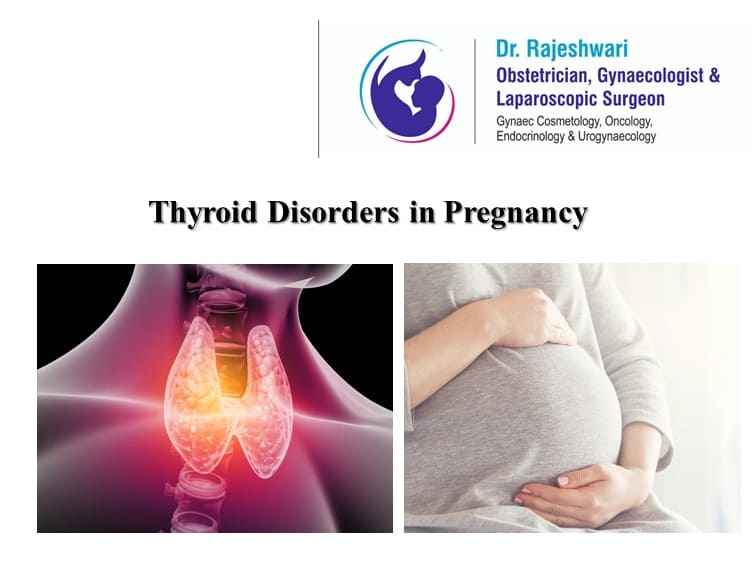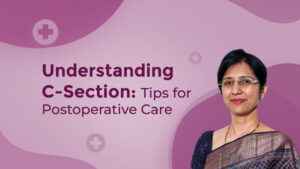Thyroid disorder is a very common finding in women of reproductive age. It is also the second most common endocrine condition affecting pregnant women after diabetes. Thyroid disorders affect nearly about 5 to 6% of pregnancies. Complicated pregnancy and neonatal abnormalities are the potential outcomes of thyroid diseases, but comprehensive treatment and management can help reduce the risks. Let us try to understand the types of thyroid disorders and their management during pregnancy.
Thyroid Disorders Definition: These are a group of disorders that affect the thyroid gland – a butterfly-shaped gland. It produces thyroid hormones. Excess thyroid hormone production may cause hyperthyroidism (hyperactive thyroid) and low levels of thyroid hormones cause hypothyroidism (underactive thyroid). Both these states affect the normal functioning of the body.
Hyperthyroidism in Pregnancy
Hyperthyroidism in pregnancy occurs in 3 to 4 of 1000 pregnancies. It may be due to a Grave’s disease (an autoimmune disorder). In this condition, the immune system makes antibodies (thyroid-stimulating antibody – TSI) that stimulate the thyroid gland to make excess thyroid hormone.
- Other causes include – enlarged thyroid due to goitre. The thyroid gland increases in size.
- Transient hyperthyroidism during early pregnancy is due to high levels of hCG associated with morning sickness (hyperemesis gravidarum).
- Molar pregnancy.
Hypothyroidism in pregnancy
Nearly about 3 out of every 100 pregnant women have hypothyroidism. It may be due to an autoimmune Hashimoto’s disorder – wherein the body’s own antibodies attack the thyroid gland making it inefficient to make thyroid hormones.
Thyroid and pregnancy complications
Untreated thyroid disorders during pregnancy can lead to growth restrictions, high blood pressure, placental abruption and increase the risk of miscarriage.
Hyperthyroidism during pregnancy can cause a drastic rise in blood pressure (preeclampsia) in the later stages of pregnancy; heart failure, low birth weight, miscarriage, premature birth; and thyroid storm – which may cause a sudden worsening of symptoms.
Severe hypothyroidism during pregnancy can cause extremely high blood pressure, heart failure (rarely), stillbirth, miscarriage, anaemia and low birthweight.
Thyroid hormones are crucial for the development of the brain and nervous system of the growing foetus – especially during the first trimester. Therefore, untreated hypothyroidism can cause neurodevelopmental problems and low IQ in children. Thus, conditions of the thyroid during pregnancy affect the baby.
Symptoms of thyroid disorders during pregnancy
Symptoms of hyperthyroidism during pregnancy include irregular and rapid heartbeat, weakness, trembling hands, failure to maintain normal weight during pregnancy or weight loss, heat intolerance.
Symptoms of hypothyroidism during pregnancy include severe constipation, muscle cramps, problems coping with cold, extreme tiredness, lack of concentration and memory issues.
How to control thyroid during pregnancy?
Management of thyroid disorders during pregnancy: Some women with a mild form of hypothyroidism with no apparent symptoms may not require treatment. Gynaecologists just monitor their condition.
Gynaecologists recommend testing thyroid hormone levels every 4 to 6 weeks during the first trimester and thereafter – and then at least once every 30 days in fasting status. The doctor will suggest the adjustment of medicine (doses) during this time.
Iodine is essential during pregnancy for the normal functioning of the thyroid gland. A growing baby too gets iodine from the diet mother takes. Pregnant women need adequate iodine as per the guidelines (talk with your gynaecologist regarding which diet is best for you). Good sources of iodine include iodized salt, dairy foods and seafood, eggs, meat and poultry.
Thyroid disorders in Pregnancy guidelines
Women who are at increased risk owing to a family history of thyroid disorders or any other autoimmune disease should go for screening (TSH) as per the current recommended guidelines. In addition, women with a family history of diabetes mellitus or a past history of thyroid disease and also with a past history of thyroid therapy should go for screening. Proper diagnosis and apt management help in minimizing the risk and improved outcomes. According to current guidelines, women at high-risk for thyroid disease should go for TSH screening before or during early pregnancy.
Treatment for thyroid disorders during pregnancy
Doctors prescribe the hormone (levothyroxine) that the thyroid gland no longer make (hypothyroidism). It is the same as T4. This is safe for the baby as well– and therefore – important until the baby starts making her own hormone. For women who have had thyroid before their pregnancy, their doctors decide the dose of levothyroxine.
For mild cases of hyperthyroidism during early pregnancy, doctors may not recommend treatment but monitor the condition. Sometimes, hyperthyroidism is associated with excessive vomiting (hyperemesis gravidarum), doctors treat vomiting and dehydration. For severe cases of hyperthyroidism, doctors prescribe antithyroid medicines.
Bottom Line
Identification of Thyroid Disorders During pregnancy is a bit challenging as the symptoms associated with them often mimic the symptoms of pregnancy. Whatever may be the case, thyroid conditions must be managed promptly to ensure better outcomes during pregnancy. Therefore, thyroid treatment is indispensable during pregnancy for maternal and foetal health and well-being. Untreated thyroid issues cause complications during pregnancy.
“Can a woman with thyroid disorders get pregnant?” is the most frequently asked question by many women. Thyroid disorders can go unnoticed or undiagnosed. Thyroid disorders make it difficult to conceive and also causes complications during pregnancy, but with early diagnosis, proper management and treatment, women can have healthy pregnancy and baby.
Normal thyroid levels in pregnancy
TSH – 0.1 – 2.5 mU/l in early trimester.
For additional information and guidelines pertaining to normal thyroid levels during pregnancy, talk to your gynaecologist and endocrinologist.




